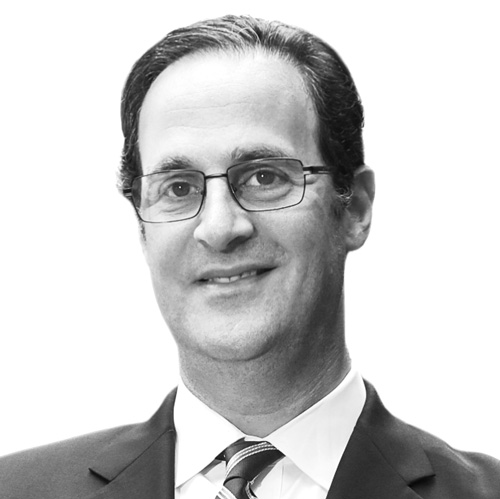When Donald Bunnin was a freshman at the University of Michigan in 1994, he began studying biology and chemistry with the intent to go to medical school. However, after two years of premed, he realized that medical school wasn’t going to be the place for him, so he switched his major to political science. From there, Bunnin followed a familiar path for political science majors: he enrolled in law school.
Although it may not have been his original intention, Bunnin went on to graduate from the USC Gould School of Law and have a successful, diverse career in law—including five years at Latham and Watkins in litigation, where he worked on intellectual property, copyright, trademark, unfair competition, and other related work; two years at a boutique litigation firm in Chicago; a small stint at a plaintiff firm; and a year at Greenberg Traurig, where he did government investigation and enforcement action work. At each firm, he quickly excelled.
In 2010, almost twenty years after he first set his sights on medical school, Bunnin joined the healthcare industry at global pharmaceutical company Allergan. Since then, he has moved up from litigation counsel to senior litigation counsel to the executive director and senior counsel for litigation and commercial eye care.
How did you first come across Allergan?
Bunnin: I spent about two years of my time at Latham working for Allergan on a case involving BOTOX Cosmetic. It introduced me to some of the people in Allergan’s legal department and in other parts of the company as well as to one of its flagship products.
What type of adjustments did you have to make moving in-house for Allergan?
Bunnin: When you’re at a firm, you’re the front line of the case. You deal with opposing counsel, draft briefs, take depositions, review documents, and prepare witnesses. You’re in the nuts and bolts of the case. As an in-house litigator, you’re more of a case strategist and facilitator, doing strategy analysis and marshaling resources. In my case at Allergan, I have anywhere from forty to eighty cases at a time. In some sense, it’s what I would expect it’s like as a senior partner at a firm but without business development or firm governance responsibilities.
If you’re a senior partner at a firm, you can’t draft all the briefs, take all the depositions, etc. You have to be at a much higher level, strategizing and working with your colleagues and the client to steer the ship toward that ultimate goal.
There’s also some give and take. You’ll have to give up some things you like. I liked writing briefs, depositions, and arguing in court. I don’t do that anymore. However, I also gave up some things I didn’t like, such as extensive document review and legal research. Conversely, there are things in-house that I didn’t have much of an opportunity to do before, such as mediations and arbitrations. A lot of that I really like.
The other big thing is that you’re advising a business, and businesspeople can be very different from lawyers. As an example, at a law firm, the memo to file might be eight or ten pages, going through an issue, citing all the cases, and setting out all the caveats. That isn’t typically how the business world works. When I’m dealing with my business colleagues, I can’t send them a lengthy memo. They live in a bullet point world where it’s results-oriented; businesspeople want concise answers. It’s not a law school exam. And I don’t mean that in a negative way to law firms or lawyers; it’s just a different world. They don’t have time to read the fourteen-page memo.
The other thing is there’s a huge difference in not being on a billable hour. You’re not judged in any way by the amount of time you spend. You’re judged more on efficiency and results. Those are also important at law firms, but there usually is the addition of billable hours.
Is there any other advice you would give to lawyers that are transitioning in-house?
Bunnin: First, learn your business from top to bottom. If it’s a pharmaceutical company, know the products, their labels, indications, and safety profile. Get to learn the key people for the products. You need to know people in R&D and commercial. The more people you know, the better lawyer you can be. If you know the folks in R&D and commercial, you can make better decisions about your case, like who has the information you need and who would make a good witness. Learn the company. Who are the people in finance? Who are the people in public relations? Who’s in HR? The more people you know, the better advocate you can be on behalf of the company. It will also help you be more efficient.
What else has helped fueled your success at Allergan?
Bunnin: One thing that’s important, especially for in-house litigators, is to get the businesspeople comfortable with the legal department. For many nonlawyers there’s a natural apprehension causing them to be nervous around lawyers.
The second thing is that from the moment you have a legal matter, step one is figuring out the endgame and working your way back from that. Sometimes it’s hard to figure that out, and it takes a little bit of time, but that’s really step one.
The third important thing is that you need to have good relationships with your outside counsel and have a lot of trust in them. They need to trust you, too. Otherwise, the relationship isn’t going to work. I need to know that you’re giving me sound legal advice. And sometimes that means that you have to give me bad news.
The worst scenario is an outside lawyer who says, “You have a great case. You’re totally going to win this.” And I spend three years working the case up with that lawyer, spending hundreds of thousands if not millions of dollars, and then on the eve of trial, that lawyer comes to me and says, “This case is really bad. The law’s bad for you, the facts are bad.” That’s the worst outcome.
The best in-house lawyers I’ve seen view it as a team, and the team rises or falls together. They’re OK with an outside lawyer saying, “I got your idea, I think it’s the wrong way to go, let’s do something else.” In-house lawyers need to be comfortable being wrong and being told no.
What are some of the benefits to practicing law in healthcare?
Bunnin: If you’re intellectually curious and want to be challenged, healthcare is a highly regulated space. You have FDA regulations and guidance, various state health agencies, etc. There are so many laws in this area that you need to get comfortable with if you want to be effective and knowledgeable in this space. There’s always something new to learn.
It’s also a high-profile industry. As you can imagine, federal and state governments look at our conduct closely. The plaintiff’s bar looks at our conduct closely. Various other stakeholders look at it, too.
The variety that healthcare provides is very intellectually challenging. It can be a lot of fun. Along with that, law firms have rightfully identified healthcare as an area where they want to practice for the exact same reasons I just mentioned. So we get to work with some of the best law firms in the world; some of the most talented lawyers in the country, and I get to read their writing and pick their brains. I get to strategize with them and work with them on a daily basis. It’s a fantastic way to learn and grow as a lawyer.
Gibson Dunn is proud of its longstanding relationship with Allergan and congratulates Donald Bunnin on this well-deserved recognition as a leader and innovator in healthcare. We are honored to work with you and applaud your commitment to helping people around the world live longer, healthier lives.
“Don epitomizes what every outside counsel hopes for in a client: he is exceptionally smart, creative, decisive, and an extraordinary leader and collaborator. We are proud of his accomplishments and honored to be part of his team.” —Lori McGroder, Partner, Shook, Hardy & Bacon L.L.P.


